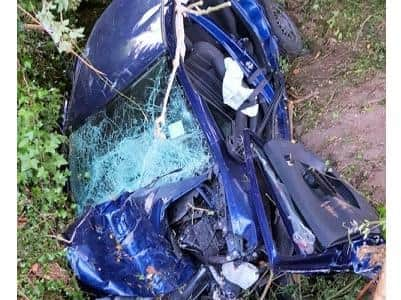Drug-driver jailed after woman, 26, dies in Ditchling Common crash
and live on Freeview channel 276
Thomas Jeeves, 31, of Junction Road, Burgess Hill, was sentenced at Hove Crown Court today (Friday, June 25) after a five-day trial.
Stephanie Ray, 26, from Haywards Heath, died in hospital a week after a crash on the B2112 Common Lane, Ditchling, on June 4, 2019.
Advertisement
Hide AdAdvertisement
Hide AdJeeves was convicted by a unanimous jury verdict of causing death by careless driving whilst over the specified limit for a controlled drug.


At about 2.30am, on the morning of the crash, Jeeves had been driving a Vauxhall Corsa south on the B2112 Common Lane, Ditchling when he 'lost control of the vehicle' as he was 'negotiating a short section of temporary road-works'.
A Sussex Police spokesperson added: "The car left the road, crashing through a metal barrier, becoming airborne and colliding with trees.
"The front seat passenger, a 22-year old woman, along with Jeeves himself, suffered serious injuries.
Advertisement
Hide AdAdvertisement
Hide Ad"The rear seat passenger, Stephanie Ray, was also seriously injured and sadly died in hospital a week later, following complications with a medical procedure to remove her breathing tube."


Police said Jeeves was found to have had 529mcg of benzoylecgonine (a cocaine body-breakdown product) per litre of blood in his system, which is over ten times the legal specified limit for driving.
"The court heard witness evidence that Jeeves had been driving at speed earlier that evening, and that he had almost had a collision at the same set of road works a few days earlier," the police spokesperson added.
"Jeeves will serve five years in prison, and five years on licence. He was also disqualified for eight years and was ordered to take an extended re-test before he can drive again."
Advertisement
Hide AdAdvertisement
Hide AdIn sentencing Jeeves, Judge Christine Henson, told him that he had a complete incapability to accept responsibility for the collision.
She said; "Your driving fell not far short of dangerous. After colliding with a crash barrier, you have gone through a large sign and impacting with two trees.
"I conclude that you were driving at a significant speed and driving dangerously for the conditions at night.
“This was of course an illegal drug you knew you had taken, which is a relevant factor.
Advertisement
Hide AdAdvertisement
Hide Ad“Your sentence cannot reflect the loss of Stephanie Ray and what her friends and family have suffered.”
Detective Sergeant Rob Baldwin, of the Surrey and Sussex Serious Collision Investigation Unit said this has been a 'long and complex investigation', adding: "Thomas Jeeves argued that his driving was not careless, that he had not taken drugs, and that he had not been responsible for Stephanie’s death, blaming the medical procedure as the sole cause.
“Independent expert witness evidence from a Home Office pathologist, a clinical trauma consultant, and an ear, nose, and throat surgeon, found that there was a direct link between the collision and the subsequent death.
"The medical procedure was necessary and attempts to prevent her death had been carried out to a high standard.
Advertisement
Hide AdAdvertisement
Hide Ad“The chain of events which led to Stephanie’s death began with the serious injuries which she sustained in the collision, and a defendant is not generally absolved of responsibility just because of medical complications.
“I hope that the robust sentencing in the case serves to deter anyone who is thinking of driving after having taken drugs.”